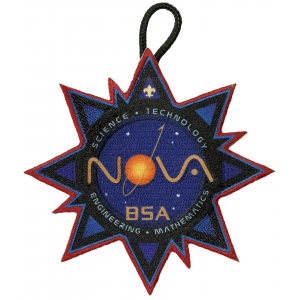The following merit badges are approved for use in earning the Scouts Supernova awards:
| Animal Science | Environmental Science | Plant Science |
| Archaeology | Farm Mechanics | Programming |
| Architecture | Fish and Wildlife Management | Pulp and Paper |
| Astronomy | Forestry | Radio |
| Automotive Maintenance | Game Design | Reptile and Amphibian Study |
| Aviation | Gardening | Robotics |
| Bird Study | Geocaching | Scuba Diving |
| Chemistry | Geology | Signs, Signals, and Codes |
| Composite Materials | Insect Study | Soil and Water Conservation |
| Dentistry | Inventing | Space Exploration |
| Digital Technology | Mammal Study | Surveying |
| Drafting | Medicine | Sustainability |
| Electricity | Mining in Society | Veterinary Medicine |
| Electronics | Nature | Weather |
| Energy | Nuclear Science | Welding |
| Engineering | Oceanography |
First-Level Supernova Award for Scouts BSA.
- Complete any three of the Scouts BSA Nova awards. (Note: These may be done at any time after becoming a Scouts BSA member.)
- Earn the Scholarship merit badge.
- Earn four of the Supernova approved merit badges from the above list. (Note: These may be earned at any time after becoming a member of Scouts BSA.)
- Complete TWO Supernova activity topics. one each in two different STEM
areas.
A Supernova activity topic is a two-part, hands-on, high-level activity related to one of the STEM fields. Part 1 involves research, preparation, set up, coordination, and/or organization. Part 2 involves analysis and reflection, culminating in the creation of a report in any one of the available format options. See the "Supernova Activity Topics" chapter. - Participate in a local, state, or national science fair or mathematics competition OR in any equally challenging STEM-oriented competition or workshop approved by your mentor. An example of this would be an X-Prize type competition.
- Do ONE of the following:
- With your parent's permission and your mentor's approval, spend at least one day "shadowing" a local scientist or engineer and report on your experience and what you learned about STEM careers to your mentor.
- Learn about a career that is heavily involved with STEM. Make a presentation to your mentor about what you learned.
- Working with your mentor, organize and present a Nova award or other STEM-related program to a Cub Scout den or pack meeting. Be sure to receive approval from the appropriate unit leader and agree on a time and place for the presentation. If a Cub Scout den or pack is not available, your presentation may be given to another youth group, such as your troop or at your place of worship.
- Review the scientific method (you may know this as the scientific process)
and note how scientists establish hypotheses, theories, and laws.
Compare how the establishment of "facts" or "rules" using the scientific
method differs from the establishment of "facts" or "rules" in other environments,
such as legal, cultural, religious, military, mathematical, or social environments.
Then do the following:- Choose a modern scientific subject with at least two competing theories on the subject and learn as much as possible about each theory,
- Analyze the competing theories, decide which one is most convincing to you, and explain why to your mentor.
- Make a presentation to your mentor that describes the controversy, the competing theories, and your conclusions about how the scientific method can or cannot contribute to the resolution of the controversy.
- Submit a Supernova award application to the district or council Nova or advancement committee for approval.
The requirements for and further information about
this award may be found in the current edition of the
Scouts BSA Nova Awards Guidebook (BSA Publication No. 34033)
or online at
https://www.scouting.org/stem-nova-awards/awards/scouts-bsa-supernova-awards/
See the "Supernova Activity Topics" chapter for more information about activity topics.








